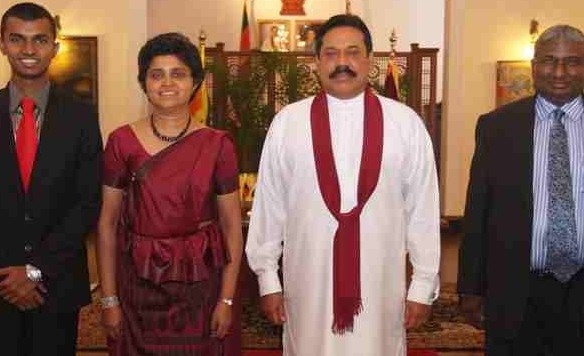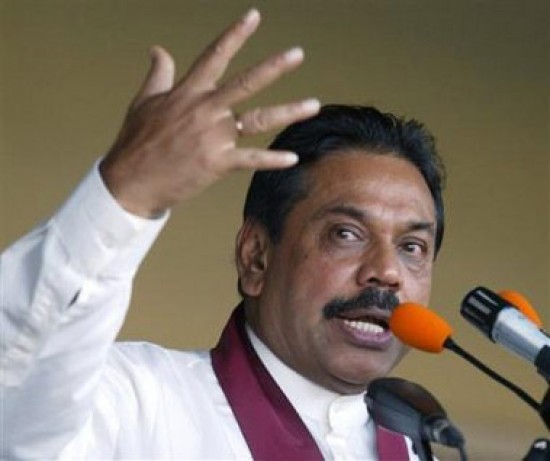Sri Lanka: Shameful Stifling Of Freedom Of Expression
Tuesday, 11 November 2012: It is heartening to witness an element of angry vigor emanating from Sri Lanka’s legal profession against the pending impeachment of the country’s
Chief Justice. The resolutions issued by the general membership of the Bar Association of Sri Lanka yesterday expressing concern over the impeachment and the indignation displayed by provincial Bar Associations show that decency and sanity is not yet lost in the country.
Stifling the Chief Justice’s response
In depressing contrast however, we have a most shameful attempt to stifle freedom of expression by a group of unnamed ‘President’s Counsel’ this week who have pontificated that replying and commenting outside Parliament on the charges contained in the impeachment motion constitutes breach of parliamentary privilege (see Island, Saturday 10th November 2012).
Unnamed worthies
Further, these worthies have stated that replying to these charges could constitute an additional charge in the impeachment motion. This is obviously aimed at stifling the publication and discussion of the letter sent by the Chief Justice’s lawyers eminently in the public interest this week, clarifying the specific allegations of alleged financial impropriety in an effort to meet the vicious avalanche of state media led attacks on her personal and financial integrity.
Taking umbrage
These ‘Counsel’ have taken umbrage at the public discussion of an impeachment motion which contains mistakes even in regard to essentials such as the correct reference to the official law reports, the correct reference to the reported case challenging her assumption of office and the correct constitutional provision in terms of which the Secretary to the Judicial Service Commission is appointed. If this was a legal document, it would have been thrown out of court at the very first instance.
Ruthless lynching
Is it any wonder therefore that, instead of a candid discussion of what these charges are all about, these ‘President’s Counsel’ urge a ruthless lynching by the state run media while the Chief Justice is supposed to remain silent and is therefore condemned in the public forum by that very silence. Where the Parliamentary Select Committee’s proceedings are held in camera and (reportedly) with even stricter restrictions imposed than normal, from where exactly is the public supposed to glean the truth?
Or is the truth no longer relevant in this country where a sitting Chief Justice is now facing the exact fate meted out to Sri Lanka’s former Army Commander, both of whom have fallen foul of this administration? These are valid questions in the public interest.
Inapplicability of Parliamentary privilege
These government backed lawyers, conferred with ‘silk’ by President Mahinda Rajapaksa appropriately enough for favours done, appear to be blissfully unaware of the precise legal nature of parliamentary privilege. One may well ask, are they aware of the law at all? It would be vastly amusing if it was not so tragic.
For their enlightenment, (assuming that this is indeed possible), parliamentary privileges do not exist to prevent public scrutiny of parliamentary proceedings but are merely the “sum of the peculiar rights enjoyed by the House collectively and by members individually in order to enable the proper carrying out of constitutional functions” (Erskine May’s Parliamentary Practice, 22nd Ed, London Butterworths, 1997).
Sri Lanka’s Parliamentary (Powers and Privileges) Act No 21 of 1953 (as amended), modeled on the English law, lists grave breaches of privilege in Part A of the Schedule. These are serious acts amounting to criminal offences which were mandated by the original Act to be punishable only by the Supreme Court. Lesser offences (such as disrespectful conduct in the precincts of the House) listed in Part B of the Schedule are in the hands of Parliament to punish.
In consonance with the draconian tone of the Jayawardene administration at that time, an amendment of 1978 gave Parliament concurrent power with the Supreme Court to punish in respect of these offences. But this amendment was repealed during the Kumaratunga administration and exclusive power restored to the Supreme Court in that regard. In all fairness, the repeal was in response to repeated appeals by legal activists that this was an undesirable power given to parliamentarians.
Threat made with malice
Importantly however, even in respect of breaches contained in Part A., the prohibitions are strictly defined. These include willfully publishing any false or perverted report of any debate or proceedings of the House or a committee or words ordered to be expunged by the Speaker or any defamatory statement reflecting on the proceedings and character of the House or any member thereof.
Relevantly these prohibitions cannot, even in the wildest imagination of these “Counsel’ who would like to spew any lie for the benefit of the government, encompass the publication of a deliberately reasoned and carefully worded response by the Chief Justice, sent through her lawyers, to reverse the considerable harm sought to be done to her reputation. Neither can it restrain balanced commentary on the substantive contents of the motion.
This threat is made with the malicious intention of ‘chilling’ discussion of a matter that goes to the heart of the integrity of Sri Lanka’s legal system. As such, it needs to be roundly condemned.
Rendered a laughing stock in the eyes of the world
Quite apart from all this, let us however assume (hypothetically) that an extremely defamatory report is published by a newspaper, putting into issue the very integrity of the Parliamentary Select Committee in question and offending the grave privileges stipulated in Part A.
If an objection is brought in this context, it will be the very Supreme Court who will assess the gravity of reports critical of the parliamentary process in regard to the impeachment of its own Chief Justice. The absurdity of this does not need to be spelt out for the dim witted or the deliberately obtuse among us.
These ill conceived, ill judged and ill timed actions against the head of the country’s judiciary only hides the fury and chagrin of the government against a Chief Justice who is not seen to be abasing herself sufficiently enough before it.
The Bar has now indicated that enough is enough in no uncertain terms. In doing so even at this late hour, a clear message has been passed to the government. This is only the beginning of a long and difficult struggle as the pieces of a once proud legal system are sought to be painfully retrieved. Assuredly the very survival and public legitimacy of the Bench and the Bar remains contingent on this struggle.
About AHRC: The Asian Human Rights Commission is a regional non-governmental organisation that monitors human rights in Asia, documents violations and advocates for justice and institutional reform to ensure the protection and promotion of these rights. The Hong Kong-based group was founded in 1984.


